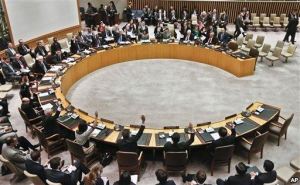
The sanctions adopted by the United Nations Security Council in spring 2013 provide for a whole range of measures aimed against research and development of ballistic missiles. The sanctions include an asset freezing and a ban on the travel of a number of North Korean officials and businessmen to other countries, as well as the freezing of the assets of such organisations as the 2nd Academy of Natural Sciences and the Korea Complex Equipment Import Corporation.
Under this trend, all government agencies, other businesses, banks, organisations and individuals under the jurisdiction of the RF are prohibited from providing advisory support for organisations from the DPRK, as well as providing them with services associated with the supply, manufacture, maintenance or use of the items, materials, equipment, goods and technology which could contribute to the implementation of the nuclear programme of Pyongyang.
Besides, the sanctions include a ban on the import into the DPRK of a whole range of equipment and materials: lubricants, valves, special corrosion-resistant steels, ceramic composite materials and vacuum pumps. Luxury items such as “jewellery with pearls”, precious stones, diamonds, sapphires and emeralds cannot be imported into the country either. The list also includes yachts, luxury automobiles and estate cars (station wagons) as well as racing cars.
Of course, if you really want to, this news could be interpreted as “at last Russia has joined the international community and imposed sanctions against the DPRK”. However, if you dig deeper, you can notice the following.
Firstly, we were the last to do it – even later than China. It has been more than half a year since the time when we should have done it. Clearly, this does not indicate that Moscow was eager to impose sanctions. It is not even clear what role was played by the visit of Vladimir Putin to the RK, where the DPRK’s nuclear programme had also become the target of the usual criticism.
Nevertheless, Russia performed the required curtsy to the international community, and the reason for such steps had been explained by the author repeatedly. On the one hand, we value our border stability, and it is clearly seen from Moscow that the status quo within which the Korean peninsula is not a hot spot is a lesser evil. On the other hand, we should not oppose our will to the international community when there is no need for that. Besides, other conditions being equal, a nuclear-weapon-free Korean peninsula is, of course, better than a nuclear one.
Deterring the DPRK’s nuclear programmes is our strategic goal also because, in the strategic perspective, if Pyongyang plays the nuclear missile card beyond a certain limit, it will, on the contrary, complicate both the relations between our countries and the security situation in the region as a whole. We have discussed this previously as well.
Secondly, the imposition of sanctions is, to a large extent, a ceremonial gesture. Taking into account the present level of economic ties between the DPRK and Russia, we can easily ban the export to that country of those goods which nobody has been exporting to that country and nobody has even intended to do so. But from the formal point of view, all looks good – the obstacles have been put in place although nobody has been really affected.
Besides, mind you that the list of the goods which “could contribute to the DPRK’s nuclear or ballistic missile programme” can be interpreted either in a very broad or very narrow way. Yes, if you really want to, you could include in the list nitrogen fertilizers, from which you can make explosives, or cement, from which you can make concrete to build another reactor, but it is most likely that the Russian authorities will be interpreting the list of prohibited goods in a much narrower way by adding to it only that stuff which has a direct link to the nuclear programme, and not an indirect or purely theoretical link.
Of course, the northerners are unlikely to be happy with the news because, on the one hand, Russia has ended up in the same camp as the enemies of Pyongyang and, on the other hand, because the grey zone of the interpretation might serve as an additional lever of pressure in case of possible problems in the bilateral relations. But I suppose that things will not go beyond the official or unofficial expression of displeasure because I think that in Pyongyang they are used to the fact that Russia always joins such statements from the bottom side and that Russia and China always vote on the North Korean issue unanimously. Hence, the indicated news should be perceived neither as “the Kremlin has at last foiled nuclear blackmail” nor as “Moscow has betrayed its strategic ally in the region”. The Kremlin is pursuing its goals in this context by probably hurting neither party.
Konstantin Asmolov, Candidate of Historical Sciences, senior research fellow at the Centre for Korean Studies, Institute of the Far East RAS, exclusively for the New Eastern Outlook online magazine.
